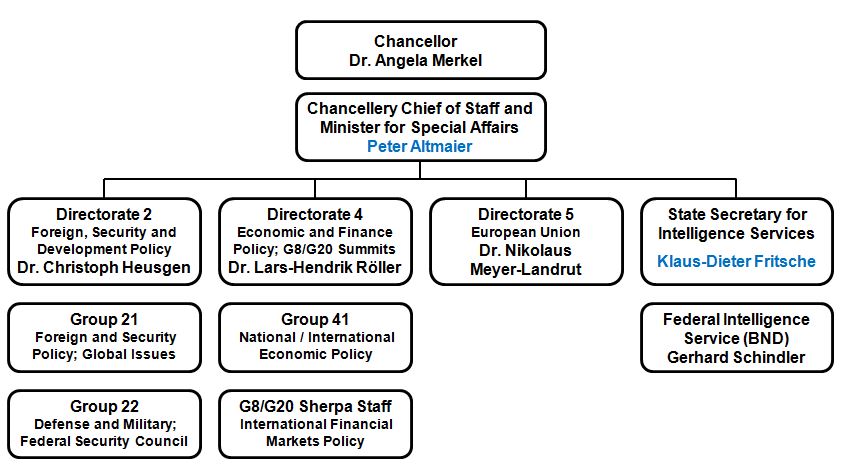Federal Chancellery
Stephan Wallace
Defense and Security Policy Analyst
Stephan Wallace is a defense and security policy analyst following political, military, and economic developments in Europe. He has worked more than 33 years on this area for the U.S. government, most recently for the U.S. Department of Defense.
The Bundestag elected CDU Chairman Dr. Angela Merkel to her third term as Chancellor on 17 December 2013. Merkel received 462 votes, 42 less than the total of all coalition deputies in the Bundestag but well above the absolute majority of 316 votes required for election.[1]
At the beginning of her third term, Merkel has emerged as Europe’s dominant political leader, a situation resulting as much from the comparatively weak positions of other national leaders as from Merkel’s own governing skills and Germany’s dominant economic and financial position in the EU. Despite some grumbling from CDU conservatives about her appropriation of SPD and Greens positions in an effort to dominate the center of German politics, Merkel faces no serious challenges from within her party and continues to enjoy strong public support.
By her own admission, Merkel is cautious and takes her time to weigh all the risks before making decisions. She is determined to move forward on long-term goals but lacks a sense of urgency and is willing to accept incremental progress. Merkel also is reluctant to get too far in front of the German electorate and has been criticized by some political observers as more of a follower than a shaper of public opinion.[2]
Merkel is an intensely private leader and reveals few details about her personal and family life. Her office in the Chancellery contains few personal items. One notable exception is a small portrait of Russian Empress Catherine the Great, whom Merkel reportedly views as an inspirational role model.[3]
Foreign and security policy leadership positions in the Federal Chancellery (changes shown in blue text).
Peter Altmaier (CDU) is the new Chief of Staff and Minister for Special Affairs in the Chancellery. He replaced Ronald Pofalla, who left to take a position on the supervisory board of the German national railway, Deutsche Bahn. Altmaier, who holds the rank of a cabinet minister, leads the work of the Federal Chancellery and is responsible for coordinating the work of the other ministries and maintaining relations with parliament and the German states (Länder).
Altmaier served in the previous cabinet as Minister for Environmental Protection and Nuclear Reactor Safety from May 2012 to December 2013 and was First Parliamentary Whip for the CDU/CSU Bundestag group from 2009 to 2012. He served as Parliamentary State Secretary in the Interior Ministry during Merkel’s first grand coalition government.[4]
Altmaier worked for the European Commission from 1990 to 1994, when he was first elected to the Bundestag. He later served as President of Europa-Union Deutschland, the German affiliate of the Union of European Federalists, from 2006 to 2011 and has described himself as a “convinced European” who supports the goal of a European federal state.[5]
Dr. Christoph Heusgen (CDU) remains in place as Merkel’s foreign and security policy advisor and head of the Chancellery directorate responsible for foreign and security policy and international development policy. He has held the job since late 2005, when Merkel recruited Heusgen away from his position as Director of the EU’s Policy Planning and Early Warning Unit, the precursor to today’s External Action Service, under then EU High Representative for Common Foreign and Security Policy Javier Solana. Heusgen was instrumental in building the unit for Solana, with whom he reportedly worked very well despite their different personalities. Solana spokeswoman Cristina Gallach said Heusgen was one of Solana’s closest collaborators and that he excelled because of his dedication, loyalty, and a profound sense of the importance of building a new pillar of European cooperation.[6] Since returning to Germany, Heusgen has become Merkel’s most trusted advisor on foreign and security policy—the one who explains the world to her and through whom most foreign governments communicate with the Chancellor.[7]
Heusgen reportedly prefers his role as advisor and has no ambitions to become a high-profile foreign policy actor. He almost always is with the Chancellor when she travels or meets with foreign leaders, but keeps a low profile. According to a recent article in Rheinische Post, Heusgen does not give interviews and speaks only “on background.”[8]
Dr. Lars-Hendrik Röller has headed the Chancellery’s Directorate 4, which is responsible for economic and finance policy, since July 2011. He serves as Merkel’s chief economic advisor and sherpa for the annual G8 and G20 summits. Röller’s team in the Chancellery also coordinates German positions for negotiations on a transatlantic free trade and investment partnership (TTIP) with the United States. According to government spokesman Steffen Seibert, Röller combines a strong understanding of economic theory with an unusual grasp of practical economic workings within the European Union. He worked as chief economist for the EU’s Directorate-General for Competition from 2003 to 2006 before becoming president of the European School for Management and Technology, a private Berlin business school that gave Röller the opportunity to build contacts with German business leaders.[9] A more critical article in the daily Die Welt argued that Röller, at least initially, clung too much to his academic style and was slow to adapt to the political requirements of his new position in the Chancellery.[10]
Dr. Nikolaus Meyer-Landrut has headed the Chancellery’s directorate for EU policy since February 2011, when he was promoted from within the same directorate to replace Uwe Corsepius. Since 2006, Meyer-Landrut had worked as Corsepius’ deputy, responsible for basic EU policy, relations with EU member states, and the EU’s foreign relations (external policy). Before coming to the Chancellery, Meyer-Landrut worked from 2002 to 2003 as spokesman for President of the EU Constitutional Convention Valéry Giscard d’Estaing.[11]
Klaus-Dieter Fritsche (CSU) returns to the Chancellery to take on the newly created post of State Secretary for Intelligence Services, which was established in response to the higher profile and greater sensitivity of intelligence issues in the wake of Edward Snowden’s revelations about NSA and GCHQ surveillance activities. Coordination and direction of the intelligence services had previously been assigned to a directorate chief, although the Chancellery Chief of Staff had ultimate responsibility for this area. Fritsche, who had served as State Secretary in the Interior Ministry since November 2009, has a strong background in intelligence. He served as Vice President of the Federal Office for the Protection of the Constitution (BfV) from 1996 to 2005 and as head of the Chancellery’s directorate for coordination of Germany’s intelligence services from December 2005 to December 2009. Before moving to the federal level, Fritsche worked as office director for then Bavarian Interior Minister Günther Beckstein from 1993 to 1996.[12]
Stephan Wallace is a defense and security policy analyst following political, military, and economic developments in Europe. He has worked more than 33 years on this area for the U.S. government, most recently for the U.S. Department of Defense. He can be contacted by email at wallace.stephan@gmail.com. The views expressed are those of the author alone. They do not necessarily reflect the views of the American-German Institute (AGI).
[1] “Eindeutiges Votum für dritte Amtszeit – Bundestag macht Merkel zur Kanzlerin,“ N-TV, 17 December 2013.
[2] “Want to be a successful world leader? Do it the Angela Merkel way,” Guardian (UK), 24 September 2013; Sara Miller Llana, “The mind of Angela Merkel,” Christian Science Monitor, 23 September 2013;
[3] “Virtueller Rundgang durch das Kanzleramt,” Bundeskanzleramt/Bundeskanzlerin; Kerstin Holm, “Verwandte Seele: Eine Zarin für die Kanzlerin,” Frankfurter Allgemeine Zeitung; 24 October 2005.
[4] “Peter Altmaier Chef des Bundeskanzleramtes und Bundesminister für besondere Aufgaben – Lebenslauf,“ Bundesregierung, December 2013.
[5] Ibid.; Peter Altmaier, “Antwort von Peter Altmaier,” Abgeordnetenwatch.de, 31 May 2011.
[6] Karen Carstens, “Multilateral Man,” 18 November 2004, European Voice; Judy Dempsey, “A Staunch European Guides Merkel Policy,” New York Times, 21 November 2005.
[7] Ludger Baten, “Ein Neusser erklärt Merkel die Welt,” RP-Online (Rheinische Post), 11 January 2014.
[8] Ibid.
[9] “Berliner Ökonom wird Merkes Chefberater,” Handelsblatt, 6 June 2011; “Lars-Hendrik Röller Neuer Wirtschafsberater für Merkel,” Frankfurter Allgemeine Zeitung, 6 June 2011; Jennifer Werner, “Besuch im Kanzleramt: Lars-Hendrik Röller zieht positive Bilanz deutscher Wirtschaftspolitik,” Saguntum, 6 July 2013.
[10] “Merkels Wirtschaftsberater als Professor Ratlos,” Die Welt, 16 October 2011;
[11] Albrecht Meier, “Ein Stabilier Euro ist unsere großte Aufgabe. Porträt Nikolaus Meyer-Landrut, Merkels Europa-Berater,” Der Tagesspiegel, 17 February 2011; “Bundeskanzleramt: Wechsel der Abteilungsleiter,” Politik und Kommunication, February 2011..
[12] “Der Chef der Spione,” Die Tageszeitung, 28 December 2013; “Der neue Geheimdienst-Kontrolleur,” ARD Tagesschau, 16 December 2013; “Fritsche wird Geheimdienst-Staatssekretär im Kanzleramt,” Spiegel Online, 16 December 2013.









